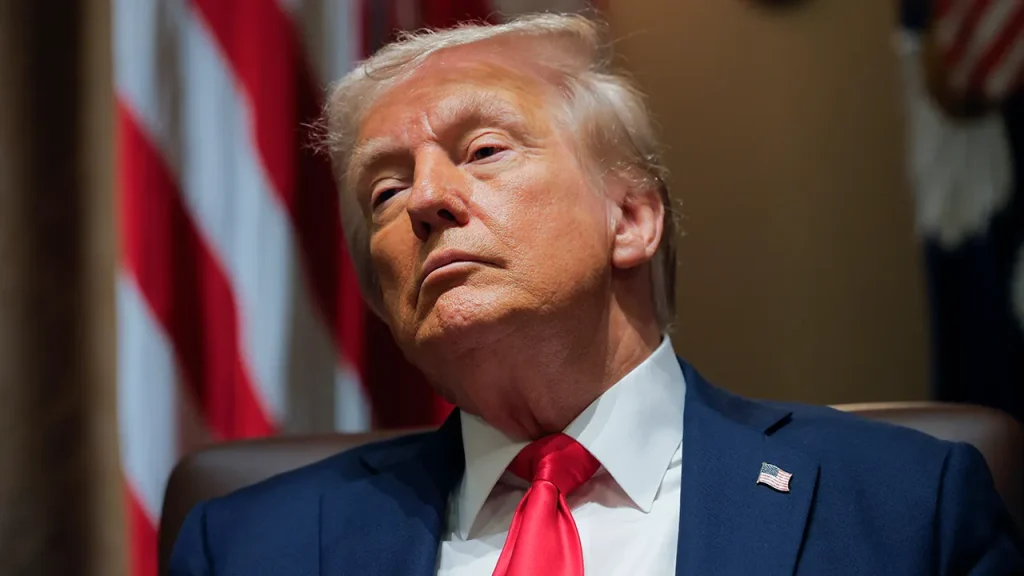In a bold assertion made on Tuesday, former President Donald Trump warned that students involved in what he termed “illegal protests” on U.S. college campuses could face severe consequences, potentially including expulsion or even imprisonment. Through a post on his Truth Social platform, Trump declared that any educational institution failing to prevent such protests would lose federal funding, creating a stir within academic communities nationwide. This announcement coincides with rising tensions on campuses, particularly concerning the ongoing Israel-Gaza conflict, contributing to a complex discourse on academic freedom, protest rights, and institutional responses.
| Article Subheadings |
|---|
| 1) Trump’s Claims on Campus Protests |
| 2) Federal Funding Threats |
| 3) Context of Recent Campus Events |
| 4) Disciplinary Actions at Barnard College |
| 5) Reactions from Students and Administrators |
Trump’s Claims on Campus Protests
In his recent post, Donald Trump emphasized a stringent approach towards what he describes as “agitators” on university campuses. He stated that these individuals will either be expelled permanently from their institutions or face imprisonment. Trump’s post aimed to resonate with those who feel that campus protests have veered into illegality, especially as tensions flare around political issues such as the Israel-Palestine conflict. This rhetoric suggests a significant escalation in the discussion surrounding free speech and protest rights in educational settings, raising questions about how these actions will be interpreted and enforced.
Federal Funding Threats
During his address, Trump specified that all federal funding would be halted for any college, school, or university that permits what he termed illegal protests. This statement implies a direct financial threat aimed at institutions that fail to control the actions of their students. His declaration marks a political maneuver to leverage federal financial leverage over higher education institutions which have been criticized for allowing protests that protestors claim express antisemitism or disrupt educational activities. The implications of such a stance pose significant risks to universities reliant on federal aid and could reshape the mechanisms through which they manage student protests.
Context of Recent Campus Events
Trump’s comments come during a time of heated protests across the United States, particularly on college campuses regarding the ongoing conflict in Gaza. Following the tragic October 7, 2023, attacks by Hamas—an event that claimed approximately 1,200 lives—the reactions among students and institutions have varied widely. Various universities have witnessed both large-scale support for Palestinian causes and backlash from groups supporting Israel. This polarized environment has catalyzed fears over security, academic freedom, and the students’ right to protest, underscoring how such declarations by influential political figures can further complicate these issues. The interplay of national politics and local campus dynamics serves as a backdrop to the escalating clashes between ideological factions within academic spaces.
Disciplinary Actions at Barnard College
At the forefront of recent events is Barnard College, which has seen a rise in disciplinary actions against students who participated in protests. This includes a situation where students broke into Hamilton Hall, leading to significant disciplinary measures, including expulsions. In conjunction with this, two students were expelled for allegedly disrupting a class related to the History of Modern Israel, highlighting the college’s readiness to take action in response to disruptive behaviors. Barnard’s actions reflect a growing trend among universities to clamp down on protests deemed unlawful or excessively disruptive, thereby responding to broader concerns about campus safety, legal compliance, and the integrity of educational environments.
Reactions from Students and Administrators
Responses from the student body and administration at Barnard have showcased divisions on how to handle protests and disciplinary matters. Some students, particularly within Jewish student organizations, have expressed disappointment regarding the perceived lack of urgency or sufficient action from the administration in addressing antisemitic behaviors during protests. A Barnard freshman expressed concerns about the administration’s approach, stating that while the university condemned incidents, the responses have not met the expectations for action from affected students. Such feedback underscores the continual dialogue on the balance between maintaining order and protecting students’ rights to express their opinions through protests.
| No. | Key Points |
|---|---|
| 1 | Former President Trump threatens federal funding cuts to universities that allow illegal protests. |
| 2 | Students participating in protests may face expulsion or imprisonment, according to Trump’s claims. |
| 3 | Barnard College has seen disciplinary actions against students involved in recent protests. |
| 4 | Concerns arise regarding the implications for academic freedom and protest rights at universities. |
| 5 | Student responses highlight dissatisfaction with university leadership’s handling of protest-related incidents. |
Summary
The recent statements by former President Donald Trump regarding campus protests have ignited a contentious debate over the balance between free speech and institutional governance. As universities navigate the complexities of student activism particularly in light of geopolitical conflicts, the implications of potential federal funding cuts pose critical questions about the future of academic autonomy. The reactions from both students and university administrators point to a larger conversation about the rights of students to protest and the responsibilities of educational institutions to maintain a safe environment conducive to learning.
Frequently Asked Questions
Question: What did Trump propose for universities that allow illegal protests?
Trump proposed that any university permitting illegal protests would face a complete stop of federal funding, and students involved in these actions could be expelled or imprisoned.
Question: How has Barnard College responded to student protests?
Barnard College has taken disciplinary actions against students involved in protests, including expulsions for disruptive behaviors during classes.
Question: What are the concerns surrounding protests on college campuses?
Concerns include the balance between the right to protest and the need for maintaining order in educational environments, as well as handling incidents of antisemitism and other forms of discrimination that may arise during protests.



